- Home
- Josephine Tey
The Singing Sands Page 7
The Singing Sands Read online
Page 7
Very neat.
He got up and dressed, wincing each time he lifted an arm, and went down to cadge a lift from Tommy. Tommy was heart-broken at his disablement but delighted by his company, and they were so gay together, this warm spring morning, and Grant was so filled with the pleasure that ferreting out information always provided for him, that they were running through the outer suburbs of Scoone before he remembered that he was in a car. That he was shut into a car.
He was enormously gratified.
He promised to meet Tommy for lunch at the Caledonian, and went away to find the public library. But before he had gone far, a new idea struck him. The Flying Highlander would have come clicking over the points at Scoone only a few hours ago. Every twenty-four hours, from year's end to year's end, the Flying Highlander made that night journey and came into Scoone in the morning. And since the train crews habitually stuck to the same run, alternating time on and time off, there was just the chance that one of the staff who had come into Scoone on the Flying Highlander this morning was Murdo Gallacher.
So he changed direction and went to the station instead.
"Were you on duty when the London mail arrived this morning?" he asked a porter.
"No, but Lachie was," said the porter. He stretched his mouth into a line, let out a whistle that would have done credit to an engine, tilted his head back an inch to summon a distant colleague, and went back to reading the racing page of the Clarion.
Grant went to meet the slowly advancing Lachie and asked him the same question.
Yes, Lachie had been on duty.
"Can you tell me if Murdo Gallacher was one of the sleeping-car attendants?"
Lachie said that Yes, Old Sourpuss was on her.
Could Lachie say where Old Sourpuss could be found now?
Lachie glanced up at the station clock. It was after eleven.
Yes, Lachie could say where he would be. He would be in the Eagle Bar waiting for someone to stand him a drink.
So to the Eagle Bar at the back of Scoone Station Grant went, and found that Lachie had been, in the main, right. Yoghourt was indeed there, mooning over a half-pint. Grant ordered a whisky for himself and saw Yoghourt's ears prick.
"Good-morning," he said amiably to Yoghourt. "I've had some very good fishing since I saw you last." He was pleased to notice the hope grow on Yoghourt's face.
"I'm glad of that, sir, very glad," he said, pretending to remember Grant. "The Tay, is it?"
"No, the Turlie. By the way, what did your dead young man die of? The one I left you trying to waken." Antagonism began to wither the eagerness on Yoghourt's face. "Won't you join me?" Grant added. "A whisky?" Yoghourt relaxed.
After that it was easy. Yoghourt was still prickled with resentment at the inconvenience that he had been caused. He had even had to attend the inquest in his spare time. It was, Grant thought, as easy as dealing with a toddler who had just learned to run. It needed only a touch to steer him in any required direction.
Yoghourt had not only hated having to attend the inquest, he had hated the inquest and he had hated every single soul connected with the inquest. Between his hatred and two double whiskies he provided Grant with the most detailed account of everyone and everything. He was the best value for money that Grant had ever had. He had been "on" in the affair from first to last; from the first appearance of B Seven at Euston to the coroner's verdict. As a source of information he was pure horse's mouth, and he "gave" like a beer tap.
"Had he travelled with you before?" Grant asked.
No, Yoghourt had never seen him before and was glad that he was never going to again.
This was where Giant's satisfaction suddenly changed to satiation. One more half-minute of Yoghourt and he would be sick. He pushed himself off the counter of the Eagle Bar and went to look for the public library.
The library was frightful beyond description: a monstrosity in liver-coloured stone; but after Yoghourt it seemed the fine flower of civilisation. The assistants were charming, and the librarian was a thin little piece of faded elegance with a tie no broader than the black silk ribbon of his eyeglasses. As an antidote to too much Murdo Gallagher, it could not have been better.
Little Mr. Tallisker was a Scot from Orkney—which, he pointed out, was not being a Scot at all—and he was both interested in and knowledgeable about the Islands. He knew all about the singing sands on Cladda. There were other alleged singing sands, too (every Island wanted to have what its neighbours had as soon as they heard about any new possession, whether it was a pier or a legend), but the Cladda ones were the original. They lay, like most of the Island sands, on the Atlantic side, facing the unbroken ocean, looking out to Tir nan Og. Which, as Mr. Grant might know, was the Gaelic heaven. The land of the eternally young. It was interesting, wasn't it, how each people evolved its own idea of Heaven? One as a feast of lovely women, one as forgetfulness, one as continuous music and no work, one as good hunting grounds. The Gaels, Mr. Tallisker thought, had had the loveliest idea. The land of youth.
What sang? Grant asked, interrupting the dissection of comparative bliss.
It was a moot point, Mr. Tallisker said. Indeed, you could have it either way. He had walked them himself. Endless miles of pure white sand by a brilliant sea. They did "sing" as one trod on them, but he himself held that "squeak" would be a better description. On the other hand, on any day that provided a steady wind—and such days were of no unusual occurrence in the Islands—the fine, almost invisible, surface sand was swept along the wide beaches so that hey did in fact "sing."
From sand Grant led him to seals (the Islands were full of seal stories, it seemed; the translation of seals into men and vice versa; if they were to be believed half the population of the Islands had some seal blood in them) and from seals to walking stones, and on all Mr. Tallisker was interesting and informative. But on streams he fell down. Streams seemed to be the only things on Cladda that were exactly like their counterpart anywhere else. Except that they too often spread into little lochs or lost themselves in bog, the streams of Cladda were just streams; water in the process of finding its own level.
Well, thought Grant, going away to meet Tommy for lunch, that in a way was "standing." Running into standing water, into bog. B Seven might have used the word because he needed a rhyme. He had wanted something to rhyme with sand.
He listened with only half an ear to the talk of the two fellow sheep-farmers that Tommy brought to lunch, and envied them their untroubled eyes and their air of unlimited leisure. Nothing hounded these large range creatures. Their flocks were decimated every now and then by strokes of fate: great snowstorms or swift disease. But they themselves stayed quiet and sane, like the hills that bred them. Big slow men, full of little jokes and pleased with small things. Grant was very conscious that his obsession with B Seven was an unreasonable thing, abnormal; that it was part of his illness; that in his sober mind he would not have thought a second time about B Seven. He resented his obsession and clung to it. It was at once his bane and refuge.
But he drove home with Tommy even more cheerful than when he had set out. There was practically nothing about the inquest on Charles Martin, French mechanic, that he did not now know. He was that much to the good. And that was a lot.
After supper that night he discarded the book on European politics which had shared with Tommy's telephone his interest on the previous evening and went hunting along the bookshelves for something about the Islands.
"Are you looking for anything in particular, Alan?" Laura asked, looking up from The Times.
"I'm looking for something about the Islands."
'The Hebrides?"
"Yes. I suppose there is a book about them."
"Hah!" said Laura, mock amused. "Is there a book about them! There's a whole literature, my dear. It's a distinction in Scotland not to have written a book about the Islands."
"Have you any of them?"
"We have practically all of them. Everyone who has ever come to stay here
has brought one."
"Why didn't they take them away with them?"
"You'll see why when you have a taste of them. You'll find them on the bottom shelf. A whole row of them."
He began to go through the row, gutting the books with a swift practised eye.
"Why this sudden interest in the Hebrides?" Laura asked.
"Those singing sands that Wee Archie talked about stuck in my mind."
"That must be the first time Wee Archie has ever said anything that stuck in someone's mind."
"I expect his mother remembers his first word," Tommy put in from behind the Clarion.
"It seems that Tir nan Og is just one jump west from the singing sands."
"So is America," said Laura. "Which is much nearer the Islanders' idea of Heaven that Tir nan Og is."
Grant, repeating Mr. Tallisker's speech on comparative heavens, said that the Gaels were the only race who visualised Heaven as a country of the young, which was endearing of them.
"They are the only known race who have no word for No," Laura said drily. "That is a much more revealing characteristic than their notions of eternity."
Grant came back to the fire with an armful of books and began to go through them at leisure.
"It is difficult to imagine a mind that has never evolved a word for No, isn't it?" Laura said musingly, and went back to The Times.
The books varied from the scientific, through the sentimental, to the purely fantastic. From kelp-burning to the saints and heroes. From bird-watching to soul's pilgrimages. They varied, too, from the admirable but dull to the unbelievably bad. It seemed that no one who had ever visited the Islands had refrained from writing about them. The bibliographies at the end of the soberer books would have done justice to the Roman Empire. On one thing all were agreed, however: the Islands were magic. The Islands were the last refuge of civilisation in a world gone mad. The Islands were beautiful beyond imagining, a world carpeted with wild flowers and bounded by a sea that broke in sapphire on silver beaches. A land of brilliant sunlight, of good-looking people and heart-searching music. Wild, lovely music handed down from the beginning of time, from an age when the gods were young. And if you wanted to go there, see MacBrayne's timetable on Page 3 of the Appendix.
The books lasted Grant very happily until bed-time. And while they drank their nightcaps, he said, "I'd like to have a look at the Islands."
"Make a plan for next year," Tommy said, agreeing. "There's quite good fishing on Lewis."
"No, I mean now."
"Go now!" Laura said. "I never heard anything so daft."
"Why? I can't fish until my shoulder is better, so I might as well go exploring."
"Your shoulder will be better in two days with my treatment."
"How does one get to Cladda?"
"From Oban, I should think," Tommy said.
"Alan Grant, don't be absurd. If you can't fish for a day or two, there are a hundred other things you can do instead of being bucketed about on a Minch crossing in March."
"Spring comes early to the Islands, they say."
"It doesn't to the Minch, believe me."
"You could fly, of course," Tommy said, considering the subject as he considered everything that was put in front of him, with a kind sobriety. "You could fly one day and come back the next, if you liked. It's quite a good service."
There was a little silence while Grant met his cousin's eye. She knew that he could not fly, and why.
"Give it up, Alan," she said, in a kinder tone. "There are much nicer things to do than being stood on one's head in the middle of the Minch in March. If you just want to get away from Clune for a bit, why don't you hire a car—there's a very good garage in Scoone—and go exploring on the mainland for a week or so? Now that the weather is soft, it will be getting green in the West."
"It isn't that I want to get away from Clune. Quite the contrary. If I could take Clune en bloc with me, I would. It is just that I have got bitten with the idea of those sands."
He saw Laura begin to consider the idea from a new angle, and he could follow her thought quite well. If this was what his sick mind wanted, then it would be wrong to try to dissuade him. The interest of a place he had never seen before should be an ideal counteraction to self-conscious brooding.
"Oh, well, what you want is a Bradshaw, I suppose. We do have one, but it's mostly used as a door-stop or a step for the top book-shelf, so it's a little out of date."
"As far as the services to the Outer Islands are concerned, it won't matter what the date of it is," said Tommy. "The Laws of the Medes and the Persians are not more unchangeable than MacBrayne's schedules. As someone has remarked, they don't exactly encroach on eternity but they very nearly outlast time."
So Grant found the Bradshaw and took it to bed with him.
And in the morning he borrowed a small case from Tommy, and packed into it the" bare necessities of existence for a week or so. He had always had a passion for travelling light, and it always pleased him to be getting away by himself, even from people he loved (a trait that had done much to keep him single), and he caught himself whistling under his breath as he put the few things into the small space. He had not whistled to himself since the shadow of unreason had reached out and taken the sunlight from him.
He was going to be foot-loose again. Foot-loose: it was a beautiful thought.
Laura had promised to drive him into Scoone in time to catch the train to Oban, but Graham was late in coming back with the car from Moymore village, so that it was touch-and-go whether he caught the train at all. They made it with thirty seconds to spare, and a breathless Laura pushed a bundle of papers into the open window as the train pulled out, and gasped: "Enjoy yourself, my dear. Seasickness does wonders for the liver."
He sat, alone in the compartment, in a daze of contentment with the magazines unheeded on the seat beside him. He watched the bare empty landscape trundle by and grow slowly greener as they went west. He had no idea why he was going to Cladda. It was certainly not to gather information in the police sense. He was going—to find B Seven. That is as near as it could be put into words. He wanted to go and see the place which so nearly reproduced the landscape of the poem. He wondered, sunk in sleepy bliss, whether B Seven had ever talked to anyone about his Paradise. He remembered the writing and thought not. Those tightly arcaded ins and ns were too defensive to have been made by a talker. In any case, it didn't matter how many people he had talked to about the thing, since there was no way of making contact with them. He could hardly put an advertisement in the papers saying: Read this poem and tell me if you recognise it.
Or—why couldn't he?
His sleepiness fell from him while he considered this new angle.
He considered it all the way to Oban.
In Oban he went to a hotel, ordered a self-congratulatory drink, and while he consumed it he wrote to each of the London daily papers, enclosing a cheque and asking them to print an identical notice in their personal column. The notice said:
The beasts that talk, the streams that stand, the stones that walk, the singing sand. . . . Anyone recognising please communicate with A. Grant, c/o P.O., Moymore, Comrieshire.
The only daily papers to which he did not send his appeal were the Clarion and The Times. He did not want Clune to think that he had taken leave of his senses altogether.
As he made his way along the front to the cockleshell in which he was due to brave the Minch, he thought: It will serve me right if someone writes to say that the thing is one of the best-known lines of some Xanadu concoction of Coleridge's, and that I must be illiterate not to have known it. The wallpaper consisted of far too heavy roses hanging from a far too slender trellis-work, and the insecure character of the whole thing was increased by the fact that the paper not only hung away from the wall but moved about in the draught. It was not readily obvious where the draught came from because the small window was not only tightly shut but had patently been tightly shut since its manufacture and original in
sertion in the house structure about the beginning of the century. The little swing mirror on the chest of drawers lived up to its promise in the first respect but not in the second. It would swing with ease amounting to abandon through the whole circle of 360 degrees, but it did not reflect anything to any noticeable degree. A last year's cardboard calendar folded in four kept its gyratory talents in check, but nothing, of course, could be done to increase its powers of reflection.
Two of the four drawers in the chest were capable of being opened. The third would not open because it had lost its knob, and the fourth because it had lost the will. Above the black iron fireplace with its frill of red crinkled paper brown with age was an engraving of a partially clothed Venus comforting a quite unclothed Cupid. If the cold had not already eaten into his bones, Grant thought that the picture would have finished the process.
He looked from the little window down on the small harbour with its collection of fishing-boats, at the grey sea slapping drearily against the breakwater, and the grey rain beating on the cobbles, and he thought of the log fire in the sitting-room at Clune. He toyed with the idea of going to bed as the quickest way of getting warm, but a second glance at the bed dissuaded him. Its plate-like thinness was made even more plate-like by the meagre covering of a white honeycomb cotton cover. At the foot, a turkey-red cotton quilt suitable for a doll's perambulator was folded into an elaborate pattern. Above it brooded the finest collection of unmatching brass knobs that it had ever been Grant's fortune to meet.
Cladda Hotel. The gateway to Tir nan Og.
He went downstairs and poked the smoky fire in the sitting-room. Someone had banked the fire with the potato peelings from lunch, so his efforts were not very successful. Rage came to his rescue and he rang the bell with all his might. The wires jangled in a crazy dance somewhere in the walls, but no bell rang. He went out into the lobby where the wind was coming soughing in under the front door and shouted. Never, even in his best form on the "square," had he used his voice with so passionate a determination to produce results. A young female creature came from the back regions and stared at him. She had a face like a rather practical Madonna and legs the same length as her body.

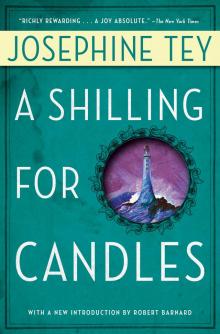 A Shilling for Candles
A Shilling for Candles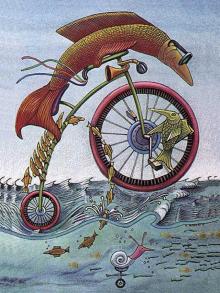 The Singing Sands
The Singing Sands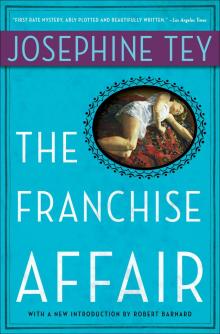 The Franchise Affair
The Franchise Affair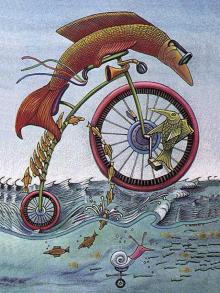 Daughter of Time
Daughter of Time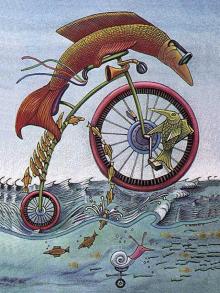 To Love and Be Wise
To Love and Be Wise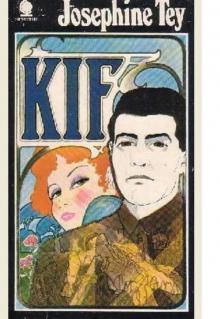 Kif
Kif The Expensive Halo: A Fable Without Moral
The Expensive Halo: A Fable Without Moral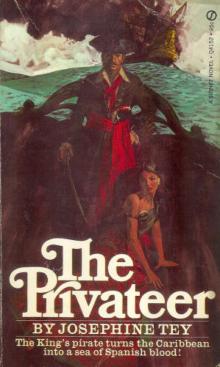 The Privateer
The Privateer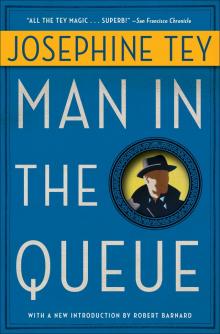 The Man in the Queue
The Man in the Queue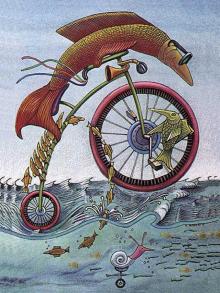 Miss Pym Disposes
Miss Pym Disposes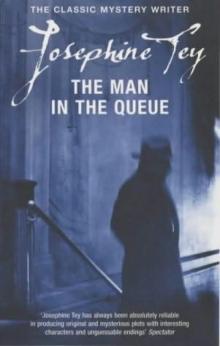 The Man in the Queue ag-1
The Man in the Queue ag-1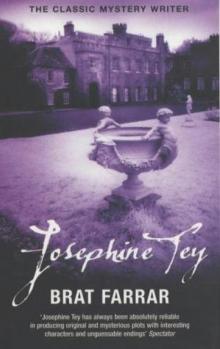 Brat Farrar
Brat Farrar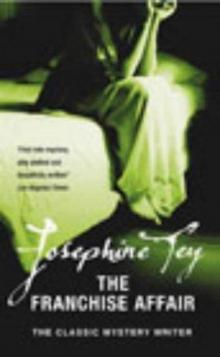 The Franchise Affair ag-3
The Franchise Affair ag-3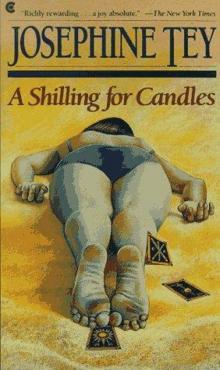 A Shilling for Candles ag-2
A Shilling for Candles ag-2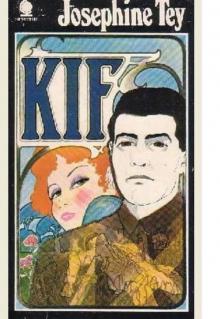 Kif: An Unvarnished History
Kif: An Unvarnished History The Expensive Halo
The Expensive Halo The Singing Sands ag-6
The Singing Sands ag-6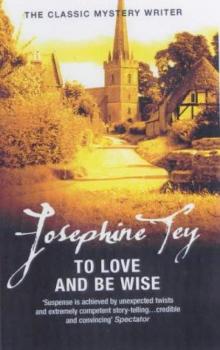 To Love and Be Wise ag-4
To Love and Be Wise ag-4